 |
| Nepal 2007: Facts on the Conflict |
|
|
|
|
|
|
|
| Nepal's Fragile Peace Process |
Kathmandu/Brussels,
28 September 2007 (International Crisis Group (ICG)
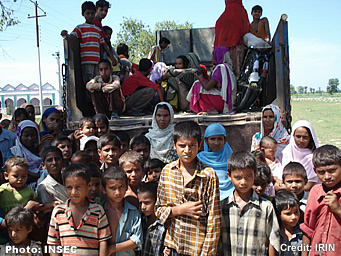 |
|
If the Maoists do not participate, polls will be impossible, but their leaders need help in winning over dissidents within their movement and moving decisively away from undemocratic tactics.
Even if they rejoin government (or contest the polls from opposition), weak political will, poor governance and security and unresolved claims for representation by marginalised groups jeopardise the vote. Key elements of the 2006 deal still need to be addressed and democratic parties have yet to prove that they have taken on board popular demand for a reformed political culture.
"The ball is now in the government's court", says Rhoderick Chalmers, Deputy Director of Crisis Group's South Asia Project. "The mainstream parties need to address reasonable Maoist concerns, hold firm to democratic principles and take sensible steps to engage critics of the Constituent Assembly".
The November 2006 Comprehensive Peace Agreement (CPA) was never as comprehensive as its name implies and has been undermined by limited implementation and monitoring. Maoist discontent and bad behaviour has been exacerbated by the lack of effort on all sides to build genuine eight-party consensus and fulfil all parts of the peace deal. The mutual confidence necessary to implement the agreement has decreased, and parties have been slow to recognise their shared responsibility to make the process work.
The major parties need to work at bringing the Maoists back on board, but if they wish to inspire public confidence, they must also now start nationwide campaigning and unambiguously recognise that an elected assembly is the only way to guarantee legitimacy of the process. A cross-party consensus on security plans with the buy-in of local populations is essential to build a viable environment for elections. As well as long-term planning for the national security sector, immediate steps to tackle impunity and restore trust in police and courts would boost public confidence and restore some legitimacy to a faltering process.
The international community should support the peace process by monitoring the polls and offering development aid only in accordance with the CPA's spirit. The UN Mission should be kept, though its limited mandate leaves it little chance to influence the political context.
"The
delaying tactics of most political leaders keep the prospect of failure
uncomfortably close", says Robert Templer, Crisis Group's Asia Program
Director. "There is no viable alternative plan to the Constituent Assembly
elections, and the only forces waiting in the wings would have little concern
for democracy or peace".
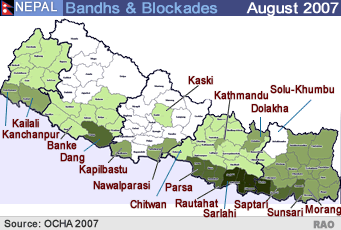 |
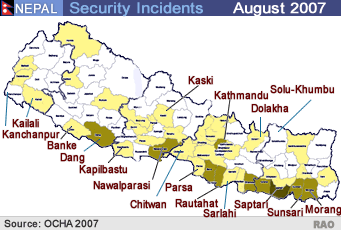 |
| ICG Asia Briefing N°68: Nepal's Fragile Peace Process |
OVERVIEW
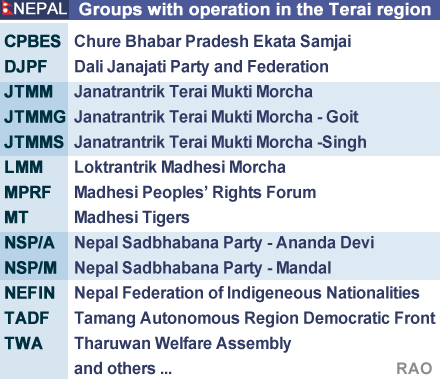 |
|
The Maoists could contest elections from outside government but polls without their participation would be meaningless, and they retain the capacity to make the country ungovernable if they oppose the process. Critical elements of the 2006 peace deal, such as security sector reform, remain to be tackled, while implementation and monitoring of past agreements have been minimal. Primary responsibility for steering the process lies with the mainstream parties, which need to demonstrate coherence, commitment and a will to reform their own behaviour if lasting peace is to be established.
Parties have started emphasising the importance of the election, and increased signs of commitment from most have added momentum to a process which had been suffering from dangerous drift. At the same time, the formerly confident Maoists have shown increasing nervousness at facing the electorate. Maintaining a sense of purpose, especially through nationwide campaigning, will increase public confidence and leave less room for spoilers to manoeuvre. Opponents of the process, especially royalists alarmed at the growing republican consensus, are desperate to derail it but have a chance only if the major parties are weak and divided.
Several armed groups have vowed to disrupt the election; mid-September communal violence following the killing of a former vigilante leader left around two dozen dead and illustrated how easily a fragile situation can tilt into dangerous unrest. More serious violence is a real risk. An election postponement will only reduce such dangers if major parties agree on urgent, substantive steps to address the grievances and governance failings that have fostered recent unrest. Failing this, further delays will only make solutions harder to find and invite unhelpful recrimination and finger-pointing.
The
November 2006 Comprehensive Peace Agreement (CPA) was never as comprehensive
as its name implied, and it has been undermined by limited implementation
and monitoring. Maoist discontent is partly a result of exaggerated expectations
but has been exacerbated by the lack of effort on all sides to build genuine
eight-party consensus and fulfil all parts of the peace deal. The mutual
confidence that enabled the agreement to be reached had to increase to
ensure its implementation; instead it has decreased in many areas, with
parties unwilling to recognise their shared responsibilities to make it
work. The ball is in the government's court, with the mainstream parties
needing to address reasonable Maoist concerns, hold firm to democratic
principles and take sensible steps to engage CA opponents.
| RECOMMENDATIONS |
![]() The
government and its constituent parties should:
The
government and its constituent parties should:
![]() sustain efforts to bring the Maoists back on board;
sustain efforts to bring the Maoists back on board;
![]() start nationwide electoral campaigning, on a party basis but also emphasising
a common agenda of peace and constitutional change, recognising unambiguously
that an elected assembly, not the appointed body some politicians have
quietly sought, is the only way to guarantee the process' legitimacy;
start nationwide electoral campaigning, on a party basis but also emphasising
a common agenda of peace and constitutional change, recognising unambiguously
that an elected assembly, not the appointed body some politicians have
quietly sought, is the only way to guarantee the process' legitimacy;
![]() create a secure environment for free and fair polls by reaching cross-party
consensus on security plans, engaging groups opposed to the polls in dialogue,
and discussing the functioning of post-poll government and the CA, including
how to guarantee roles for all stakeholders;
create a secure environment for free and fair polls by reaching cross-party
consensus on security plans, engaging groups opposed to the polls in dialogue,
and discussing the functioning of post-poll government and the CA, including
how to guarantee roles for all stakeholders;
![]() develop mutually agreed mechanisms to implement the CPA and monitor parties'
fulfilment of their commitments;
develop mutually agreed mechanisms to implement the CPA and monitor parties'
fulfilment of their commitments;
![]() take on security sector reform, with both short-term measures to boost
local accountability and trust in the police and by moving forward discussion
of longer-term plans, including the future of the national and Maoist armies;
take on security sector reform, with both short-term measures to boost
local accountability and trust in the police and by moving forward discussion
of longer-term plans, including the future of the national and Maoist armies;
![]() deal sensibly with Maoist fighters in cantonments, resolving disputes over
allowances and facilities and building on cooperation in these areas and
the now resumed combatant verification process; and
deal sensibly with Maoist fighters in cantonments, resolving disputes over
allowances and facilities and building on cooperation in these areas and
the now resumed combatant verification process; and
![]() tackle impunity (for example, acting on disappearances while starting a
genuine consultation on broader transitional justice issues) and restore
trust in the judiciary (including by the Maoists stopping parallel people's
courts), and in institutions such as National Human Rights Commission.
tackle impunity (for example, acting on disappearances while starting a
genuine consultation on broader transitional justice issues) and restore
trust in the judiciary (including by the Maoists stopping parallel people's
courts), and in institutions such as National Human Rights Commission.
![]() The
international community should:
The
international community should:
![]() support the peace process and the elections, including by giving practical
help through monitors and reminding all political actors, especially the
Maoists, that obstructing progress will cost them international legitimacy;
support the peace process and the elections, including by giving practical
help through monitors and reminding all political actors, especially the
Maoists, that obstructing progress will cost them international legitimacy;
![]() offer development assistance only in accordance with the spirit of the
CPA, which includes recognising the Maoists' party, the CPN(M), as a legitimate
political actor (and part of the government, should it rejoin) and engaging
it in donor programs, including in security sector reform and political
training; and
offer development assistance only in accordance with the spirit of the
CPA, which includes recognising the Maoists' party, the CPN(M), as a legitimate
political actor (and part of the government, should it rejoin) and engaging
it in donor programs, including in security sector reform and political
training; and
![]()
without raising expectations that it can resolve domestic political difficulties,
be prepared to offer good offices to facilitate consensus if requested
by the parties.
Kathmandu/Brussels, 28 September 2007
The International Crisis Group (Crisis Group) is an independent, non-profit, non-governmental organisation, with over 130 staff members on five continents, working through field-based analysis and high-level advocacy to prevent and resolve deadly conflict.
| Madhesi factbox |
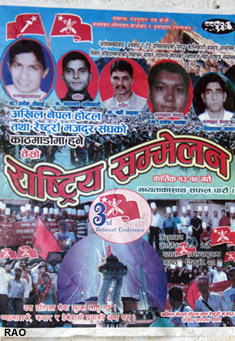 |
|
| External links |
|
International
Crisis Group (ICG)
|
|
|
|
|
Nepal
Social |
|
|
 |

